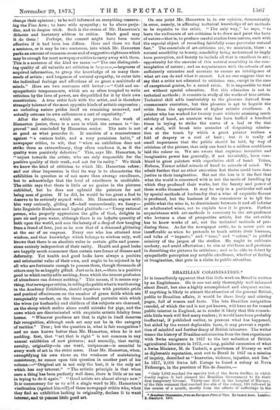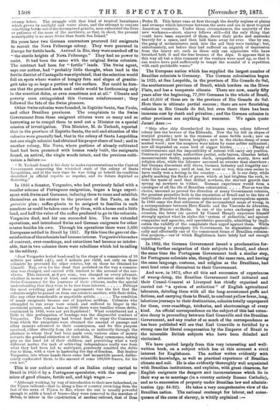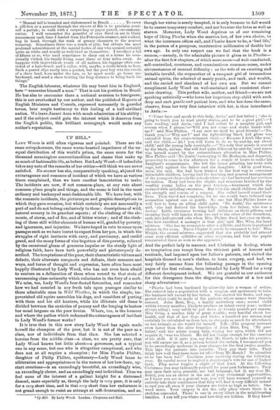BRAZILIAN COLONISATION.*
IT is immediately apparent that this little work on Brazil is written by an Englishman. He is one not only thoroughly well informed about Brazil, but also a highly accomplished and eloquent writer. If anything is likely to attract the attention of the general British, public to Brazilian affairs, it would be these lively and stirring pages, full of reason and facts. The late Brazilian emigration scandal, of which the end is not yet known, will have so far roused public interest in England, as to render it likely that this remark- able little work will find many readers ; it would have been probably ineffectual, if published earlier, to prevent what has happened, but aided by the recent deplorable facts, it may prevent a repeti- tion of mischief and further decoy of British labourers. The writer traces the history of Brazilian colonisation from the first experiment with Swiss emigrants in 1817 to the last seduction of British agricultural labourers in 1872,—a long, painful succession of what a Swiss Minister, M. de Tachudi, a gentleman of literary as well as diplomatic reputation, sent out to Brazil in 1857 on a mission of inquiry, described as "knaveries, violence, injustice, and lies." In 1817, 2,006 Swiss left Europe to found a colony at Nova Fribonrgo, in the province of Rio do Janeiro,— " Only 1,682 reached the marshy foot of the Serra dosMar, in which deadly region it had pleased the Brazilian Government to fix their first temporary bivouac. Thirty-one died in the hospital of Romeo; of the thin remnant that reached tho site of the colony, 146 followed in the course of a month, mostly from the effects of sufferings in the • Bromism atioesakassireon a* Afro's= PON of Vim. By 'scarf dam. Eotadon: E. Stanford. 1873.
swamp below. The struggle with that kind of tropical luxuriance which grows by sunlight and water alone, and the attempt to conjure something better out of the decomposed granite, soon exhausted the lives or patience of the mass of the survivors, so that in short, the present municipality is no more Swiss than South Sea Island."
Six years later two German contractors procured 342 emigrants to recruit the Nova Fribourgo colony. They were procured in Europe for fertile lands. Arrived in Rio, they were marched off to " the sterile heights of Nova Fribourgo." They had no power to resist. It had been the same with the original Swiss colonists. The contract had been for " fertile" lands. The Swiss agent, says our author, had "probably little thought, when land in the fertile district of Cantagallo was stipulated, that the selection would fall on spots where wastes of hungry fern and slopes of granite- grit take up so large a portion of the surface. Nor could he fore- see that the promised seeds and cattle would be forthcoming only in the scantiest doles, or even sometimes not at all" Climate and poverty soon extinguished this German reinforcement ; they followed the fate of the Swiss pioneers.
Other Swiss colonies were founded, in Espirito Santo, San Paulo, and other Brazilian provinces. The complaints to the Swiss Government from these emigrant citizens were so many and so harrowing as to compel them to send out a Minister on a special mission of investigation. This Minister, M. de Tachudi, reported that in the province of Espirito Santo, the soil and situation of the colonies were generally bad, that in the colony of Santa Leopoldina not one single colonist had obtained his proper share of land ; and in another colony, Rio Novo, where portions of already cultivated land had been promised with houses ready built, the emigrants found, on arrival, the virgin woods intact, and the previous culti- vation a failure :—
M. Tschudi found it his duty to make representations to the Central Government respecting the wretched state of the colony of Santa Leopoldina, and at the very time he was doing so beheld its condition described in official reports as regular, and its future depicted as flattering."
In 1846 a Senator, Vergueiro, who had previously failed with a smaller scheme of Portuguese emigration, began a large experi- ment with Swiss and Germane, inducing them to come and establish themselves on his estates in the province of San Paulo, on the parchia plan ; coffee-plants to be assigned to families in such numbers as could be taken care of by them, with a house and a little land, and half the value of the coffee produced to go to the colonists. Vergueiro died, and his son succeeded him. The son extended operations, and introduced Swiss and German emigrants for other estates besides his own. Through his operations there were 3,600 Europeans settled in Brazil by 1857. By this time the general dis- satisfaction of the colonists had become intense. Vergueiro's breaches of contract, over-reachings, and extortions had become so intoler- able, that in two colonies there were rebellions which led to calling in the soldiery.
"Jose Vergueiro levied head-mail in the shape of a commission of 10 milreis per adult (.£1), and 5 milreis per child, not only on those colonists he procured for other estates, but on those he obtained for himself. Nay, even for the dead that perished on the way a commis- sion was charged, and carried with interest to the account of the sur- vivors. This interest, at 6 per cent., was charged on every advance, whether in money or kind, and sometimes on advances made by the Swiss Communes for the journeys of their citizens, under the special
understanding that they were to be free from interest. Perhaps the most revolting part of these agreements was the fact that the colonists might be passed on from one estate to another, with their debts,
like any other transferable or negotiable article The condition of many emigrants became one of hopeless serfdom. Colonists who attempted to ran away were seized, and suffered to linger in the provincial prisons, and as late as 1866 there were families whose debts, contracted in 1853, were not yet liquidated ! What contributed not a little to this prolongation of bondage was the disgraceful conduct of Vergueiro. The Company had bound itself to repay the Communes from which the emigrants were obtained the amount of passage and other moneys advanced to their countrymen, and for this purpose received, either directly from the colonists, or indirectly through the planters to whom they had been madb over, various sums of money towards the gradual extinction of their debt. Many communes, taking pity on the hard lot of their children, and perceiving what a very different matter the task of achieving independence really was from what they had been led to anticipate, graciously remitted the debts due to them, with a view to hastening the day of freedom. But Senhor Vergueiro, into whose hands these sums had meanwhile passed, delibe- rately confiscated them, to the amount of some 180,000 francs, for his own use."
This is our author's account of an Italian colony carried to Brazil in 1855-6 by a Portuguese speculator, with the usual pro- mises of good climate, fertile soil, and high wages :—
" Although working, by way of introduction to their new fatherland, on the Tijuca railroad—that is, along a line of country stretching from the feet of the serra of Tijuca to Rio, where the sun is usually powerful enough to addle a head of brass—they were removed to the marshes of Belem, to labour 'in the construction of another railroad, that of Dom Pedro IL This latter runs at first through the deadly regions of plains and swamps which intervene between the serra and sea in most tropical American countries. Under these circumstances, the majority of the new workmen—stout, sinewy fellows still—did the only thing that could have been expected of them, drove their picks and mattocks bravely for a space, and then laid them away for ever. One by one, the gang of mountaineers sank into the soil they were turning; but, unfortunately, not before they had suffered an anguish of depression from the heavy air, such as those only can appreciate who have breathed both it and the free breezes of the Alps. It appears that in this way all but a thin remnant of the venture were used up, so that it can scarce have paid sufficiently to tempt the scandal of a repetition with such perishable wares."
The European nation which has supplied the largest number of Brazilian colonists is Germany. The German colonisation began in 1825, at San Leopoldo, in the-province of Rio Grande do Sul, the southernmost province of Brazil, which borders on the River Plate, and has a temperate climate. There are now, nearly fifty years after the beginning, 77,000 Germans in the whole of Brazil, and 43,000 of these are in the province of Rio Grande do Snl. Here there is ultimate partial success ; there are now flourishing colonies in Rio Grande do Sul, but even there there has been immense cost by death and privation ; and the German colonies in other provinces are anything but successes. We again quote Jacare Assu :- "Ship after ship disembarked its human cargo, colony followed colony into the bowers of the Eldorado. Now the lot fell on slopes of scarped granite ; now in the recesses of some fertile nook ; now on some breezy, all but barren heights ; now in the choke-damp of some matted wood ; now the auspices were taken by some nobler enthusiast ;
now all depended on some lord of nigger hordes Plenty of reinforcements and the impossibility of retreat will carry any position. Contracts proved false, authorities partial, soils barren, climates lethal, measurements faulty, payments slack, sympathies scanty, laws and religion alien, while the labourer savoured no sweeter than elsewhere ; but German discontent still drove, German industry and frugality sur- vived this and more ; until at last, for weal or woe, this race seems to
have really won a footing in the country It is our duty, while gladly marking the flecks of green which at last brighten the rock, to note the lasts of seed that drifted nowhere, the starved growth that sprang up nowhere to wither. German experience would form a
catalogue of all the ills of Brazilian colonisation Poor as was the choice, unsound as proved the direction of many Government colonies, the greatest prejudice both to the reputation of Brazil and to the fate of individuals resulted from private speculators and unscrupulous agents. In 1846 came the first utterance of the accumulated sense of wrong, in a correspondence between Herr ICanitz and the Visconde de Abrantes, Brazilian Minister at Berlin. In one of the notes exchanged on this occasion, the latter (as quoted by Consul Haupt) expresses himself strongly against what he styles the ' system of seduction,' and against companies and agencies, and speculators generally, admitting by impli- cation the validity of the complaints then urged against them. While endeavouring to exculpate his Government, he stigmatises emphati- cally and effectually one of the commonest forms of Brazilian colonisa- tion projects,— one of which Englishmen have lately had sad enough experience."
In 1862, the German Government issued a proclamation for- bidding further emigration of their subjects to Brazil, and about the same time the Portuguese Government took a similar step, for Portuguese colonists also, though of the same race, and having the same language, customs, and religion as the Brazilians, had sent loud cries of discontent to their Government.
And now, in 1872, after all this sad succession of experiences of wrong-doing, the Brazilian Government itself initiated and their Consul-General at Liverpool has chiefly organised and carried out "a system of seduction" of English agricultural labourers, deluding them with all the long-accustomed puffs and fictions, and carrying them to Brazil, to confront yellow fever, long, laborious journeys to their destinations, colonies totally unprepared for them, over-reacMngs, trickeries, and shortcomings of every kind. An official correspondence on the subject of this last exten- sive decoy is proceeding between Earl Granville and the Brazilian Government, and any reader of so much of the correspondence as has been published will see that Earl Granville is fortified by a strong case for liberal compensation by the Emperor of Brazil to the miserable British subjects who have been deluded and victimised.
We have quoted largely from this very interesting and well- written book, on a subject which has at this moment a vivid interest for Englishmen. The author writes evidently with scientific knowledge, as well as practical experience of Brazilian climate and soil. He is also evidently thoroughly well acquainted with Brazilian institutions, and explains, with great clearness, for English emigrants the dangers and inconveniences which lie in their way as to marriage (in a country entirely Roman Catholic), and as to succession of property under Brazilian law and adminis- tration (pp. 84-92). He takes a very comprehensive view of the Brazilian nation. The national contempt for labour, sad °woe- queue of the curse of slavery, is wittily explained
" Manual toil is branded and dishonoured in Brazil To carry
a pill-box or a peascod through the streets of Rio is to proclaim your- self a pariah ; to walk with a carpet-bag or paper parcel, excommuni- cation. I well remember the gauntlet of eyes fixed on me in blank amazement each time I landed from the Petropolis steamer, and walked, bag in hand, through the rank of greasy chapmen to the nearest tramway. Sometimes there was a touch of pity, but always the most profound astonishment at the menial tastes of one who seemed certainly quite as white and nearly as well-bred as themselves. I recollect a lad of fifteen or so, who used sometimes to sleep out at a house he occa- sionally visited, his family living some three or. four miles away. As happens with improvident youth of all nations, his luggage often con- sisted of a hair-brush and a collar, with, maybe, a tooth-brush to boot. Such a parcel slips easily into a pocket, but the poor boy was the creole of a slave land, born under the ban, so he must needs go home un- burdened, and send a slave trotting the long distance to bring back his things."
The English labourer, whatever ills may beset him in England, here " venerates himself a man." That is not his position in Brazil. He has also to encounter there a national aversion to foreigners ; this is not overlooked by our author, and the published Reports of English Ministers and Consuls, expressed necessarily in guarded terms, bear ample testimony to this feeling of a half-civilised nation. We leave Jacare Assn with much admiration of his ability ; and if the subject could gain the interest which it deserves from the English public, this brilliant monograph would make any author's reputation.








































 Previous page
Previous page